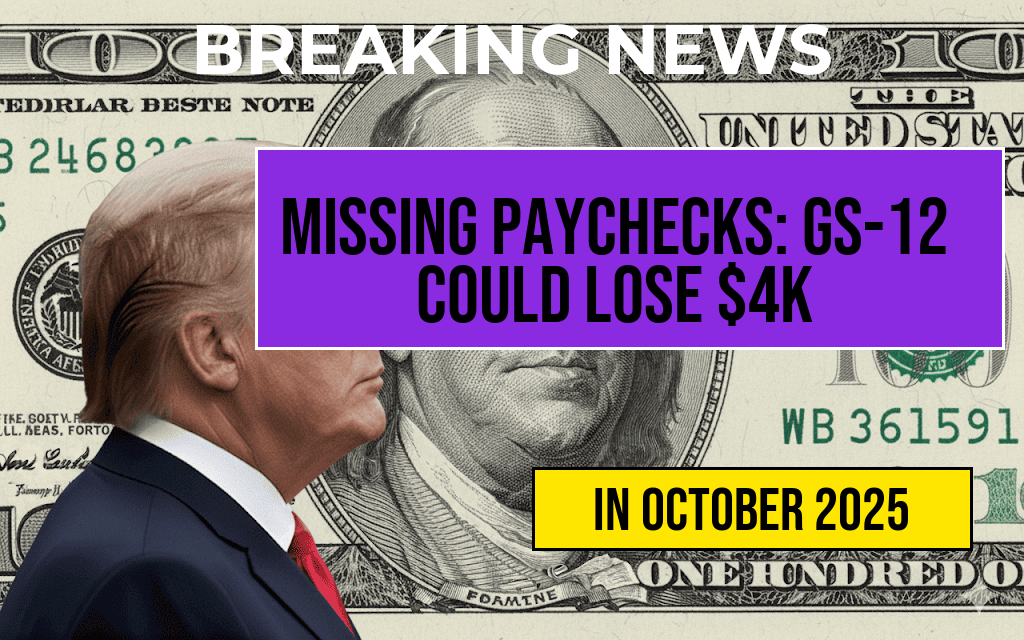Missing Two Paychecks Could Cost a GS-12 Federal Employee Up to Four Thousand Dollars—Here’s What You Can Do
A federal employee at the GS-12 level facing a delay of two paychecks may see a shortfall approaching $4,000, posing significant financial challenges. This scenario can occur due to administrative errors, delayed payroll processing, or government shutdowns. For many civil servants, such disruptions threaten their ability to meet essential expenses, including housing, utilities, and debt obligations. With the average annual salary for a GS-12 employee around $89,000, missing two pay periods—typically two biweekly payments—can result in a temporary income loss of approximately $3,400 to $4,000, depending on pay grade and locality pay adjustments. Understanding the steps available to mitigate this impact is crucial. Federal employees can explore immediate financial assistance options, communicate proactively with payroll offices, and utilize federal employee resources to navigate these setbacks effectively.
Understanding the Impact of Pay Delays on GS-12 Employees
The General Schedule (GS) pay scale structures federal salaries, with GS-12 positions earning between $71,674 and $93,796 annually, depending on locality pay. Typically, employees receive biweekly paychecks, equating to roughly 26 pay periods per year. Missing two of these can result in a loss of approximately $5,543 annually, but the immediate impact on a single paycheck ranges from $2,700 to $4,000, depending on specific salary and locality adjustments.
This shortfall can lead to missed mortgage or rent payments, late fees on bills, and increased financial stress. While most federal employees are protected from immediate payroll disruptions, ongoing delays or errors can cause temporary hardship, especially for those living paycheck to paycheck.
Common Causes of Payroll Disruptions
Understanding why such delays occur helps employees better prepare and respond. Common causes include:
- Administrative errors: Mistakes in payroll processing or data entry can temporarily halt payments.
- Government shutdowns: Periods of government shutdowns often delay federal payments until appropriations are resolved.
- Technical issues: System outages or cyber incidents may temporarily disrupt payroll services.
- Employee status updates: Changes in employment status, such as leave without pay or personnel actions, can affect timely payments.
Employees should consult official channels promptly if they suspect an error or delay.
What Can Federal Employees Do If Paychecks Are Missing?
Immediate action is essential to minimize financial strain. The following steps can guide affected employees through this stressful period:
1. Contact the Payroll or Human Resources Office
Employees should reach out to their agency’s payroll department or HR office to confirm the status of their payments. Often, delays are clerical or technical and can be resolved quickly once identified.
2. Review Pay Statements and Notices
Check recent pay statements and official notices for any alerts or explanations regarding delays. These documents can provide valuable information when communicating with payroll services.
3. Explore Emergency Financial Assistance
Many federal agencies and unions offer emergency loan programs or financial counseling. Additionally, organizations such as the Office of Personnel Management (OPM) provide guidance on financial hardship options.
4. Consider Short-Term Credit Options
If immediate funds are necessary, federal employees might explore personal loans or credit lines, but should prioritize options with manageable interest rates and transparent terms.
5. Utilize Federal Employee Resources
The FedWeek platform offers advice and community support for federal workers facing financial difficulties. Additionally, some agencies provide access to financial counseling services.
Protection Measures and Long-term Strategies
Federal employees can take proactive steps to safeguard their finances against future disruptions:
| Action | Description |
|---|---|
| Maintain an Emergency Fund | Set aside at least three to six months’ worth of expenses to cover unexpected delays or emergencies. |
| Stay Informed About Payroll Schedules | Regularly verify pay schedules and monitor pay statements through employee portals like DFAS MyPay. |
| Update Personal Information Promptly | Ensure HR records are current to prevent processing delays due to administrative errors. |
| Participate in Financial Planning | Utilize available financial counseling services to plan for income fluctuations and emergencies. |
Legal and Policy Protections
Federal employees are generally protected against wage garnishments and unlawful deductions. In cases of delayed pay, the Fair Labor Standards Act and specific agency policies provide safeguards. Employees facing extended delays should consult with legal advisors or union representatives for guidance. Additionally, the OPM offers policies outlining steps during payroll disruptions.
Resources and Support Networks
Federal employees have access to various support channels:
- Agency HR Offices: For immediate payroll inquiries and assistance.
- Union Representatives: For advocacy and guidance on payroll issues.
- Financial Counseling Services: Offered through many agencies or external organizations for budgeting and crisis management.
Understanding these resources empowers employees to respond swiftly and mitigate financial hardship caused by missed paychecks.
References
Frequently Asked Questions
Question
What are the potential financial impacts for a GS-12 federal employee missing two paychecks?
Question
How much money could a GS-12 employee lose if they miss two paychecks?
Question
What steps can federal employees take if they miss a paycheck to avoid financial hardship?
Question
Who should federal employees contact if they experience issues with their pay?
Question
Are there any resources or assistance programs available for federal employees facing pay delays?

Leave a Reply